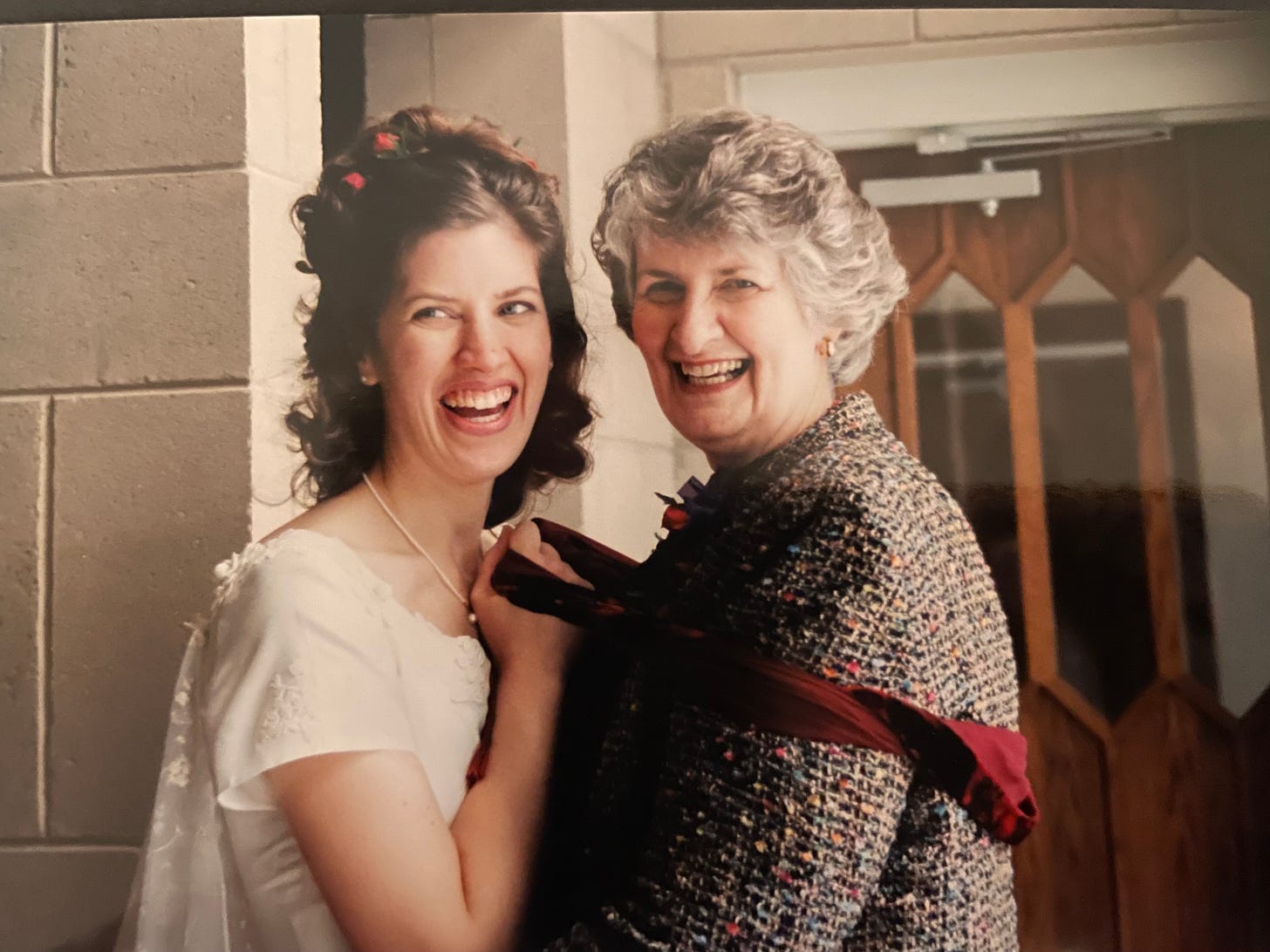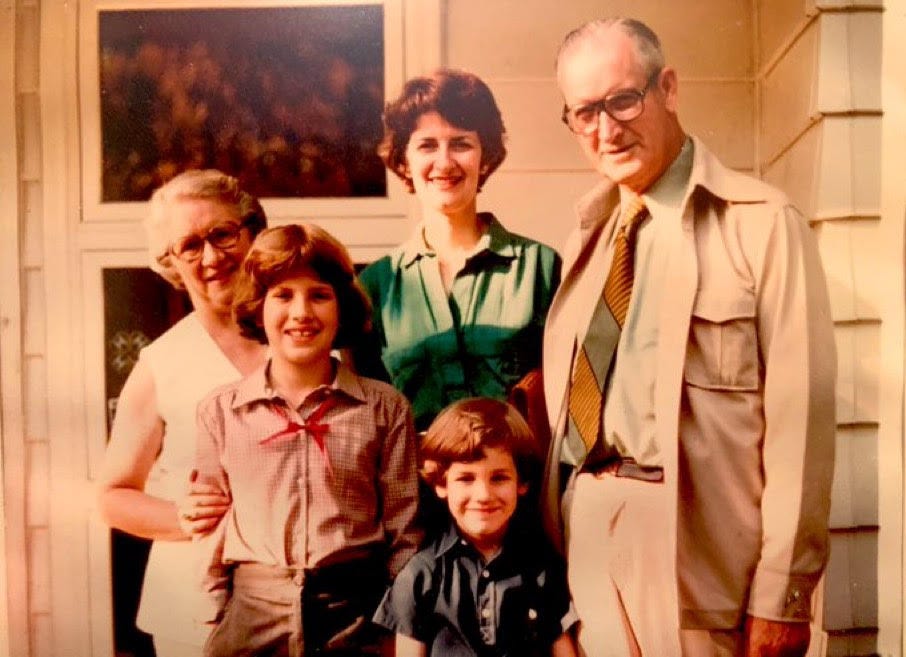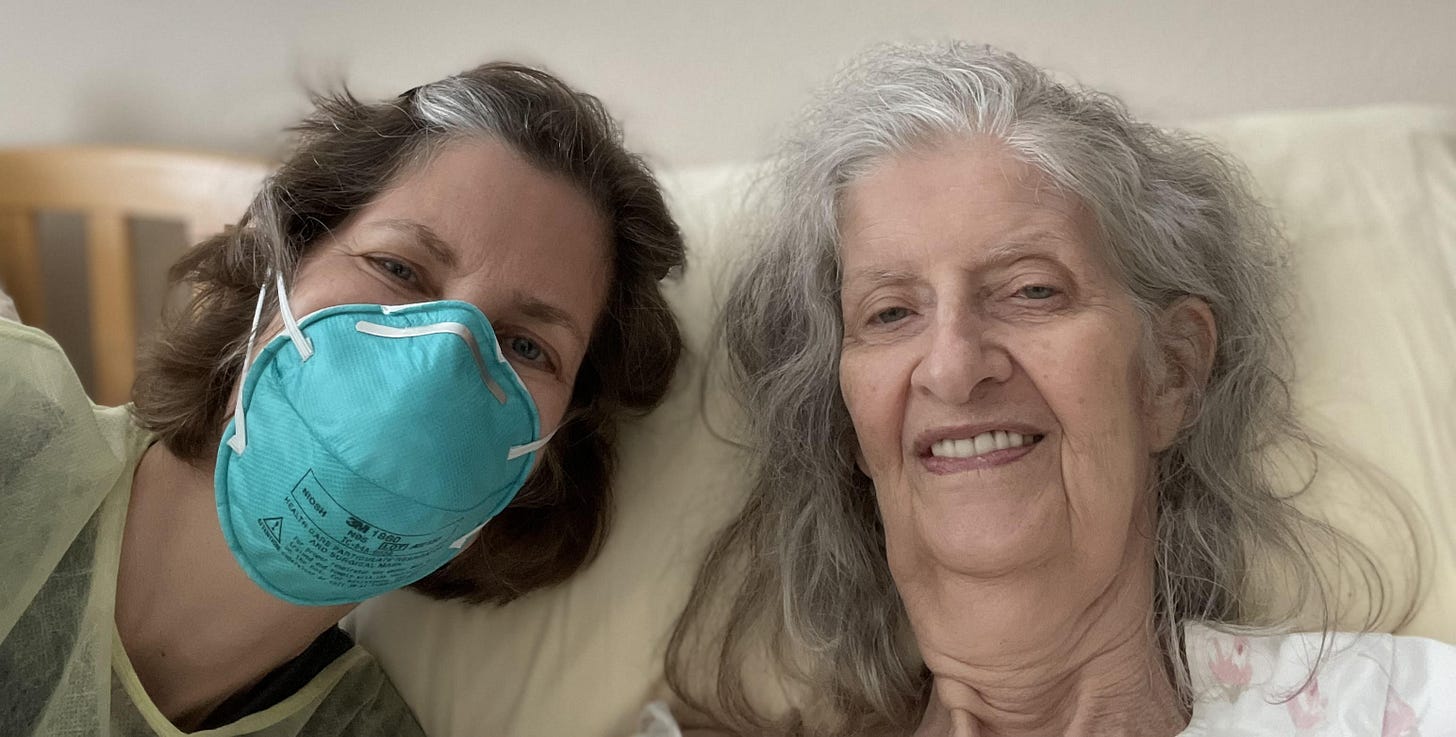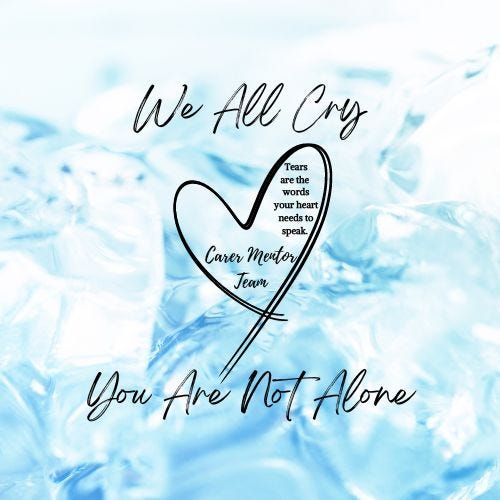My stoic mom's parting gift
Making peace with tears
<Welcome to Sandwich Season, adventures in middle age, sandwiched between aging parents and growing children ... and other duties as assigned.>
Hello everyone—
My post today is part of a monthlong collaboration of thirteen Substack writers on one very human topic: “Caring about Crying. We All Cry. You’re Not Alone.”
First, I would like to thank Victoria at Carer Mentor for inviting me to participate in this initiative! Our goal is twofold: to connect with other writers and to explore an underappreciated human phenomenon. You will find additional pieces from this anthology at the bottom of my post ... along with a link to tomorrow’s writer.
Today is Day 5 of the collaboration, and I’m sharing how—surprisingly—my mom helped me make peace with crying.
My stoic mom’s parting gift: making peace with tears
The monarchs have been in the air, here in Minnesota. On the flowers and on the trees, their coppery orange and black wings opening and closing, opening and closing, the beat of a human heart.
They take me back to this season last year, when my mom died, and suddenly I saw butterflies everywhere. Had they just arrived? Or was it only in my grief that I noticed them?
In the week before my mom’s memorial service, when I should have been finalizing catering menus, writing my eulogy and doing a hundred other things, I holed up in my office with pencil and paper, and started drawing butterflies. When I arrived at one I liked, I carved it into a thin sheet of Styrofoam from my son’s toy printmaking set, slathered it with blue paint and pressed it onto a piece of soft white paper.
There. I would add my butterfly to the flier for her memorial service, so everyone who came would hold the comfort of a butterfly in their hands.
At that service, a year ago this week, I stood at the front of my parents’ Episcopal cathedral before more than a hundred family members and friends, and told them about my mom. In the middle of that story, for some long moments, I stopped and let the tears fall.
If my mom had been there, she would have gone quietly crazy.
Sarah! she would have said under her breath, eyes wide, teeth clenched. Are you having a problem? Pull it together!
And then she would have lifted her chin and looked to the heavens, as if asking where the hell this emotional daughter had come from.
That’s pretty much what happened in the same month and same place twenty-two years earlier.
In 2001, right after the events of September 11, I quit my job as a newspaper reporter and prepared to move halfway across the United States. My husband would follow me a couple of months later, to Washington state.
The Sunday before my solo drive westward, I sat beside my mom in a pew at the back of the cathedral. Listening to the hymns, hearing the messages, I reflected on how much that place meant to me. My husband and I had joined the congregation when we were dating and had been married there just months earlier. Everywhere I looked were people who had touched my life.
As I thought about my imminent departure, the tears came, and there was nothing I could do to stop them. I looked at my mom sitting to my left. How could I say goodbye to her and these other people I loved? My mom looked back at me and, seeing my tears, looked away and gave me a little shove. Oh, stop it!
One of my nicknames for my mom—not that I ever dared call her this out loud—is “Queen of the Stiff Upper Lip.”
In my 54 years with her, I rarely saw her cry. Even near the end of her life, when she knew she had very little time left, and I sat weeping by her bedside. No, when my mom experienced sadness, her eyes shimmered, her face glowed. And that was where the drama ended.
I tried so hard to emulate her. I remember in elementary school, those restless days before Christmas vacation when our teachers would give up and declare a movie day. I would be so excited … until I learned that the feature presentation would be Where the Red Fern Grows or Old Yeller. If you’re not familiar with those stories—spoiler alert—both feature wonderful dogs that are killed or die at the end. I remember our darkened classroom growing quieter and quieter, and then slowly filling with sniffles.
I treated those viewing parties like a competition. I put on my game face. I set goals. Could I get through the show without crying? Could I at least outlast every other girl in my class?
For years I did. I was the champion. Why would we cry over fiction anyway? Clearly I had more fortitude than the others.
Then in sixth grade, my hormones must have kicked in. I lost my edge. I cried with the rest of them. And my old stoic self was gone forever.
My typical response to sadness or rage or someone else’s grief or even a really well-made TV advertisement is to become a soggy sponge. Give me a little emotional squeeze, and my eyes brim with tears. Soon they’re running down my cheeks, dripping off my chin. I’ve often said that had I been born in a different time or place, I would probably have been tapped as a moirologist, a professional mourner.
According to my mom, I take after her mom, my Saskatchewan grandma. Every time we left her house to drive the ten hours back home to Minnesota, she would stand on her brick front steps fighting back tears. If I ever grew weepy in her presence, Grandma would gently say, “Chin up.”
I have a sense that Mom saw my teary ways as some sort of backward evolution, as if I had been born with a more primitive form of emotionality. Sometimes when I cried, she took pity on me and gave me a hug. Other times, particularly when I was upset at her, she would roll her eyes. Oh, Sarah. Get over it.
Believe me, I tried.
I’ve spent much of my life trying not to cry. Distracting myself with random thoughts. Willing my tears to flow backward, so I could swallow them. Pretending to be very curious about whatever was on the ceiling.
Maybe that’s what Grandma meant when she said “Chin up.” It was less an encouraging word than a strategy. I’ve been chinning up all my life, trying to keep those tears in my eyes.
It doesn’t work.
Four Septembers ago, in the early months of the COVID pandemic and exactly nineteen years after my husband and I went west, we moved back home, with our son, to Minnesota. Mom had begun her slide into dementia, and I hadn’t realized the precipitousness of her decline. By the end of 2021, I knew my parents—and all of us—needed help on that journey. Over my mom’s objections and my dad’s denial, we gradually added in-home supports. Then, in early 2023, I helped Mom and Dad move into a retirement community.
Mom spent the last couple of months of her life mostly in bed, and I spent as much time as I could with her, beside her bed, on her bed, even in her bed, catnapping with her.
Observing her confusion and the pain she felt from the bone infection that would take her life, and anticipating our pending loss, my tears came often.
Not wanting to frustrate the Queen, I tried to hold them back. With dementia in the picture, I worried about alarming her—did she know she was dying? Sometimes? Always? Would she understand why I was crying?
There was no way to chin-up my way through that time. Sometimes Mom ignored my tears, and we went on visiting as if my face and shirt weren’t soggy. Sometimes she would look at me with compassion and comfort me with a word or smile. One of the biggest gifts she gave me as her life drew to a close was that she tolerated my tears.
Crying became my new normal, whether I was sitting with Mom, making supper at home, walking the dog or grocery shopping. I stopped fighting it. I stopped wearing mascara. There was nothing to be done. No ceiling was interesting enough to distract me from my feelings or stop those tears.
When Mom died, I realized I had things I wanted to share. We had a loving but complicated relationship, and as she neared the end of her life we had found our way to what felt like a full reconciliation. So I volunteered to give the eulogy at her memorial service.
You don’t have to, said the priest.
I generally advise people against this, said a pastor-friend.
Are you sure? asked the funeral director.
“I can do this,” I told them.
Wasn’t I all cried out anyway? I figured if I felt wobbly on the day of her service, everyone would forgive me if I simply bowed out. After all that had happened, I was feeling badass enough not to care what anyone thought. And, as insurance, my husband had promised to step in and finish reading my words if I couldn’t.
When the time came, I felt ready. I took a deep breath, walked up the steps to the lectern and looked out over a church filled with friends and family. I thanked everyone for being there to honor my mom. So professional.
And then I began to share my story of this wonderful, tear-less woman who drove me crazy and who I will miss for the rest of my life.
It was going great … until it wasn’t. The tears came. Everyone who had warned me against doing this had been right. I couldn’t speak.
So I just stopped. I held up my pointer finger, my way of silently saying, “just a moment,” and I looked to the side, away from all of those caring eyes.
Sun shone through the stained-glass windows, and the sanctuary was peaceful and still. I felt no judgement for my tears, no waves of impatience. I didn’t sense any eyes rolling or people looking at their watches or the heavens. No one gave me a shove.
I just felt held by the silence.
Then, after a few shaky breaths, I continued my eulogy.
When I finished, my brother, bless his heart, began to clap. Everyone else joined in, the sanctuary filling with sound.
It might not be surprising that my Queen of the Stiff Upper Lip was not a particularly huggy person. When we saw each other after time apart, she was always up for a hug and a kiss, but-let’s-not-make-a-habit-of-it. In junior high, I started attending a school with a culture of hugs. It baffled my mom. “Why are all of your friends so huggy?” she asked. I didn’t have an answer, but the truth is I kind of liked it.
When my mom’s memorial service ended, our family recessed from the sanctuary to the cathedral’s gathering area for a catered lunch. The funeral director guided my dad, brother and me to start the food line as ushers released everyone else, pew by pew.
With my back to the sanctuary, I lifted a slice of egg bake, some fruit and mini-scones onto my plate before turning around to look for our designated family table. That’s when I noticed the long line of people that had formed behind me. To get to my seat, I would have to squeeze past them.
I made it only a few steps before one of those in line wrapped me in a hug. When she released me, the next person hugged me. And the next. And the next. And the next. That’s when I set down my plate and gave into a ridiculously long line of hugs. Soon my dad and brother realized what was happening and left their seats to join in.
Nearly everyone who came through that line—at least a hundred people—folded us in their arms.
It was as if at this farewell party, two things that had seemed anathema to my mom—tears and hugs—were transformed into her parting gift, one that helped glue me back together.
A video of my eulogy, is available here, beginning at 22:30.
The Carer Mentor Collaboration
September Anthology Index:
Sept 1 Launch article: Caring About Crying. We All Cry. You’re Not Alone By Victoria at Carer Mentor: Empathy and Inspiration
Sept 2 Crying: 'Did you know?' Resource: Tears the science and some art. By Victoria at Carer Mentor: Empathy and Inspiration
Sept 3 'Cry, Baby. Why Our Tears Matter' A Podcast Interview. Dan Harris and Dr Bianca Harris of Ten Percent Happier with Reverend Benjamin Perry. By Victoria at Carer Mentor: Empathy and Inspiration
Sept 4 ‘In Conversation with Rev. Benjamin Perry’. Victoria interviews the Author of 'Cry Baby: Why Our Tears Matter' By Victoria at Carer Mentor: Empathy and Inspiration
NEXT UP: On Sept. 6, our next batter up is Nurse Kristin with a post titled “There’s No Crying in Baseball.” She’s a self-described “smart-mouthed Jersey girl on a mission to show (myself) the capacity to heal exists within.”










What a journey you took us through! I have tears welling up as I read your and your mom's transformation when it comes to emotional expressiveness. I can relate a lot to your experience of having a mom with a stiff upper lip who didn't take to hugging -- and this is from an entirely different culture as yours. Your writing is beautiful, vidid and so very touching.
I cried most of the way through your story. I don't cry at my own just everyone elses. In my old age, I seem to be more sensitive to everyone's joys and sorrows not necessarily my own. Thank you for this beautiful gift to your mom and to us. I will continue to cry and maybe I will figure it out some day soon.